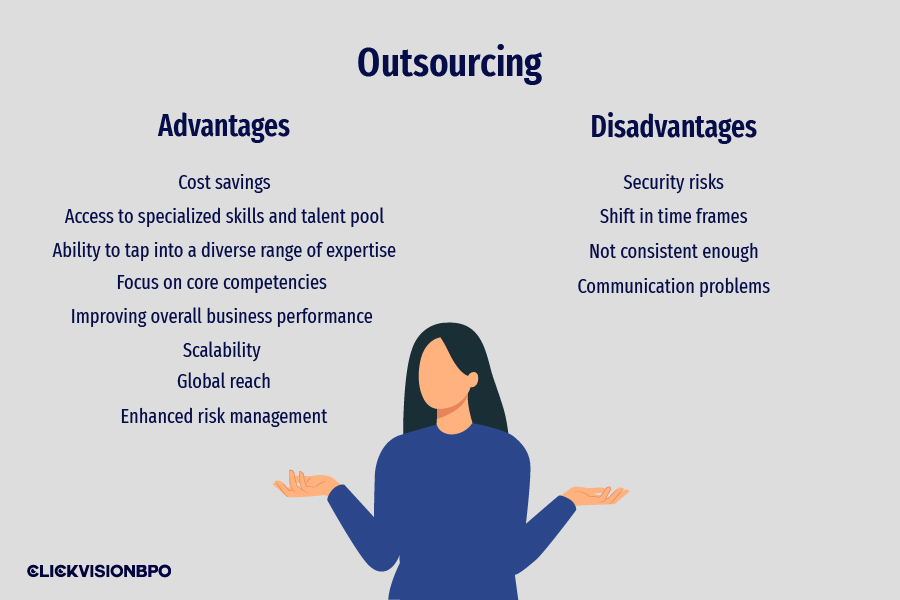In the modern business landscape, enterprises often seek to improve efficiency and gain a competitive edge. Outsourcing has emerged as a popular approach, which allows companies to delegate specific tasks or functions to external service providers. But what are the advantages and disadvantages of outsourcing?
This practice has gained massive traction across various industries. It is driven by the promise of cost savings and access to specialized expertise. At CLICKVISION BPO, we recognize the advantages and drawbacks of outsourcing arrangements.
Hence, we will provide valuable insights about this concept to help you make informed decisions regarding your business operations. Let’s start!
What Are the Advantages and Disadvantages of Outsourcing?
Outsourcing is a strategic practice that involves hiring third-party service providers to handle specific tasks, operations, or services. It can provide various benefits, including access to specialized expertise and improved overall business performance. In continuation, we listed the main 8 benefits of outsourcing.
Cost savings
Outsourcing allows businesses to reduce operational costs significantly. In fact, external providers commonly offer competitive pricing models and efficient processes. These can lead to cost savings for your company.
By outsourcing services, your company can avoid expenses associated with hiring or training employees. The same applies to obtaining resources and investing in the technology required to perform those tasks in-house.
That is why, at CLICKVISION BPO, we leverage our expertise to offer cost-effective solutions for our clients. We enable access to specialized services without the overhead expenses often associated with in-house operations.

Access to specialized skills and talent pool
Outsourcing gives businesses access to a diverse talent pool with specialized skills. Such external outsourcing vendors often bring extensive knowledge, expertise, and experience in areas that may not be available in-house.
Businesses may access a worldwide network of specialists through outsourcing, whether for data entry, marketing, customer service, or another task. These specialists have the necessary skills the companies search for their business needs.
This access enables companies to enhance the quality of their products or services. It can also increase efficiency and innovation, enabling companies to stay competitive in today’s dynamic business landscape and marketplace.
Ability to tap into a diverse range of expertise
Aside from accessing specialized skills, outsourcing allows businesses to leverage a diverse range of expertise across fields. Instead of relying on internal resources, you can collaborate with partners with expertise in your domain.
Outsourcing enables access to a broader spectrum of knowledge and experience. Such expertise diversity allows for greater innovation, problem-solving, and flexibility in addressing complex challenges and opportunities.
Focus on core competencies
Outsourcing involves delegating non-core tasks and functions to external specialists. With this practice, companies can concentrate on their core competencies. These are the unique capabilities that differentiate the companies from their competitors.
By offloading routine and specific tasks and functions, your company can redirect resources, time, and energy toward fundamental tasks. It can focus on activities contributing to its competitive advantage, objectives, and revenue.
Outsourcing can help businesses to allocate their resources effectively. Doing so can enhance productivity, foster innovation, and empower differentiation in the business landscape. Ultimately, it can drive the business towards growth and success.
Improving overall business performance
Through strategic outsourcing, businesses can improve their overall performance. The approach enables companies to access best practices, cutting-edge technologies, and industry knowledge.
Your business can enhance productivity, quality, and customer satisfaction by collaborating with providers who excel in their respective fields. Such a performance translates to higher profitability and long-term sustainability.
Scalability
Another critical advantage of outsourcing is scalability. It allows your businesses to adapt to changing demands and market conditions. External providers are typically well-equipped and trained to handle fluctuations and adjust their resources and capabilities accordingly.
They can quickly ramp up or down the resources in response to fluctuations in workload, seasonal peaks, or business expansion initiatives. The scalability eliminates the need for investing in additional infrastructure and equipment.
The same applies to hiring personnel to accommodate temporary spikes in demand. They can maintain optimal levels of efficiency and cost-effectiveness. At the same time, they can remain agile and responsive to evolving market dynamics. In today’s fast-paced business environment, scalability and flexibility are crucial.
For this reason, we offer scalable solutions tailored to our clients’ unique needs and growth trajectories. Whether ramping up operations during peak seasons or scaling down during periods of low demand, such services can help your company adapt to market dynamics.
Global reach
Outsourcing also provides opportunities for a global reach. Collaborating with external partners allows you to enter new markets and expand your international presence. This practice can be especially beneficial for companies that want to establish a global footprint.
Enhanced risk management
Outsourcing can lead to improved risk management. The reason is that the responsibility and management of specific risks are transferred to the outsourced provider. The risks can be related to technology, process management, and regulatory compliance.
Disadvantages of Outsourcing
As with any business decision, outsourcing can also have disadvantages that require careful consideration. The challenges of outsourcing often include security risks, shifts in time frames, communication problems, etc.
Security risks
Outsourcing often involves sharing sensitive information, intellectual property, and other confidential data with external outsourcing providers. That said, outsourcing certain business functions can expose companies to potential security risks.
As a result, entrusting sensitive data and critical processes often raises concerns about data security, confidentiality, and other cybersecurity vulnerabilities. Without suitable safeguarding, there are risks of data breaches and unauthorized access.
The distance and lack of direct control inherent in outsourcing can pose significant challenges regarding sensitive assets’ confidentiality, integrity, and availability. So, your company must ensure its partners have robust security measures.
You have to make sure your partners adhere to strict data protection protocols and sign confidentiality agreements. Otherwise, securing sensitive data can lead to financial loss, legal implications, and other issues. Implementing robust risk management strategies is also essential for protection.

Source: freepik.com / Photo Contributor: pressfoto
Shift in time frames
One of the drawbacks of outsourcing is the potential for shifts in project timelines and delays. A dependency on external vendors can impact the speed and efficiency of project execution. The same applies to geographical distances, cultural differences, and communication barriers.
Misalignments and miscommunication in expectations, scope changes, or unforeseen obstacles may also contribute to timeline disruptions. Consequently, your business may encounter challenges associated with meeting deadlines, satisfying customer expectations, or maintaining competitive advantages.
Therefore, we consider effective project management, clear communication channels, and contingency planning to be essential for outsourcing. They are critical to mitigate the risks associated with time frame shifts in outsourcing arrangements.
Not consistent enough
Outsourcing can also introduce concerns about inconsistency in the quality of work and service delivery. Variations in standards and operation processes may result in discrepancies connected to the achieved outcomes.
Moreover, inconsistent performance across projects or tasks can undermine trust and reliability. It can impact the business’s reputation, competitiveness, and customer satisfaction.
To mitigate such risks, we recommend establishing performance metrics. Additionally, you can establish clear expectations and quality assurance mechanisms when engaging with external outsourcing partners.
Communication problems
Outsourcing comes with communication challenges. They are prevalent when outsourcing tasks to third-party vendors or offshore locations. Differences in time zones, language, cultural barriers, cultural nuances, and technological limitations might become potential issues.
These can hinder communication and collaboration between the company and its outsourcing partners. Delays in response times and a lack of clarity in the instructions or feedback may occur, leading to inefficiencies, errors, and frustration.
Proactive communication strategies and collaboration tools are our recommendations for fostering better understanding. They can help in reaching a common solution and fostering strong work relationships.
At CLICKVISION BPO, we acknowledge the importance of effective communication and cultural sensitivity. We implement strategies to mitigate these barriers and ensure seamless collaboration with clients.

Possible Risks: Money and Reputation
Outsourcing services can potentially introduce various risks to the company’s financial health and reputation. Hidden fees, unexpected costs, and contractual disputes may arise during the course of engagement. So, understanding these risks is crucial for ensuring the success of outsourcing initiatives.
Financial risks
Unexpected costs
Outsourcing arrangements may lead to unexpected costs beyond the initial estimates. Factors like price fluctuations and additional services can contribute to the cost overturn. Scope changes and penalties can also strain the budget.
We recognize the importance of transparency and financial stability in fostering trust and long-term client partnerships. Hence, we adopt a transparent pricing model, outlining all costs and fees for our services upfront.
Hidden fees
Some outsourcing agreements may contain hidden fees and charges that are not communicated upfront. They can occur throughout the engagement course and lead to financial surprises. This can impact the overall service cost-effectiveness.
We recommend clear and detailed contractual agreements with clients, specifying service deliverables and pricing terms. Such safeguards provide both parties with clarity and protection against unforeseen financial risks.
Currency exchange rates
Companies engaging in off-shore outsourcing may also be exposed to currency exchange rate fluctuations. Changes in such rates can affect the overall cost of the services, the payment terms, and profitability.
Reputation risks
Poor performance or service disruptions by outsourcing partners can tarnish the company’s reputation and erode customer trust. Also, unauthorized access, leaks, or security breaches can expose sensitive data, compromising the company’s integrity and credibility.
If outsourcing leads to a decline in the quality of products or services, customers may experience dissatisfaction and look for alternatives. Thus, your company can implement several mitigation strategies to address the risks associated with financial aspects and reputation in outsourcing. They include:
- Negotiating transparent contracts with clear pricing, terms, and service level agreements.
- Implementing robust cybersecurity measures to safeguard sensitive data and mitigate the risk of breaches.
- Maintaining open communication channels with stakeholders and promptly addressing issues or concerns to mitigate reputational damage.

Source: freepik.com
Conclusion
Outsourcing has become a popular strategy in the dynamic business field. So, what are the advantages and disadvantages of outsourcing? This approach offers numerous advantages, including cost savings and scalability, among others.
Yet, it also presents challenges such as security risks and communication issues. Successful outsourcing requires a strategic approach aligning with the company’s goals and values, ensuring sustainable growth and competitiveness.

With a strong background in the marketing industry and healthcare leadership roles, Filip is responsible for CLICKVISIONBPO’s sales strategies and onboarding new clients. With a passion for sharing insights gained from his experience, he also shares valuable knowledge through industry related articles.
